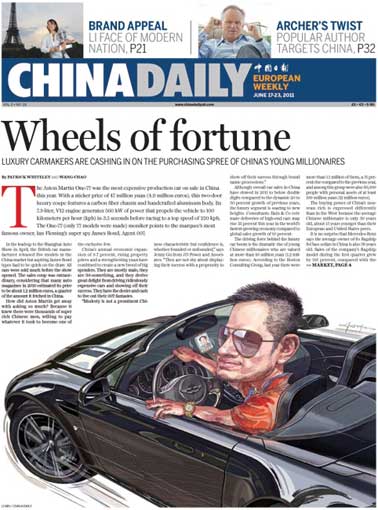Web Comments
US, Europe should study Chinese
Updated: 2011-06-23 15:31
By John Ross (chinadaily.com.cn)
The recovery from the international financial crisis continues to disappoint optimistic forecasts. The US economy's first quarter growth of 1.8 percent was slow by historical standards during an economic recovery, and was a deceleration from the previous quarter. In the European Union (EU), GDP in the first quarter of 2011 was still 2 percent below its peak of three years ago.
Due to this slow recovery, major economic policy disputes are taking place in the US and Europe. Greece's sovereign debt crisis makes front page headlines. But also looming is a fight on the US budget deficit. The US government's legal debt limit will be reached in August. The US will not default, and the limit will be raised. But the autumn will see the Obama administration and the Republican-controlled House of Representatives clash on how, and by how much, to reduce a US budget deficit running at $1.3 trillion this year, following $1.3 trillion in 2010, and $1.4 trillion in 2009.
The large European and US budget deficits limit their governments' ability to use the means they have so far used to deal with the economic downturn. Economic stimulus by further expansion of budget deficits is not practical politics in the US or most European countries.
It is therefore enlightening to compare the situation in China's economy to the US and Europe three years after the international financial crisis started. No one who wants to make a serious analysis would claim no problems face China's macro-economy - hopes of a flawless state may be left for heaven! Judging from the latest data, China's government is winning the fight against house price inflation. But food price hikes remain a serious problem - and difficult to deal with as currently food price inflation is an international phenomenon and therefore to a significant degree driven by factors not under China's control.
But in the real economic world, everything is always a question of numbers and proportion. In the three years since the financial crisis began, China's economy has grown by more than 30 percent, while the US has grown by 0.6 percent and the EU has shrunk by 2.1 percent. Better to be dealing with problems associated with China's rapid growth than the US and the EU's stagnation.
Furthermore, while the US and EU are grappling with the problems created by several years of budget deficits, which have frequently run into double digits as a percentage of GDP, China does not face this constraint. China's budget deficit last year was only 2.5 percent of GDP and it is likely to fall this year.
From the point of view of macro-economic policy there is no mystery about why China's economy is in better shape than the US or Europe. The US and EU's "Great Recession" is actually "The Great Investment Collapse." In the EU the decline in fixed investment is equivalent to the whole fall in GDP, while the weakness of US GDP recovery is accounted for by a $369 billion fall in private fixed investment since the fourth quarter of 2007.
Therefore, the core problem the US and Europe's large budget deficit programs have been unable to solve is overcoming the investment decline. Nor have ultra-lose monetary policies, including QE2, succeeded.
China, in contrast, when it was hit by the international financial crisis at the end of 2008, struck at the core of the problem. China's 4 trillion RMB ($586 billion) stimulus package targeted investment - which consequently rose. China's economic growth, compared to stagnation in the US and Europe, was a consequence of the rise in investment in China and its fall in the US and Europe.
E-paper

Pret-a-design
China is taking bigger strides to become a force in fashion.
Preview of the coming issue
Franchise heating up
Party place
Specials

My China story
Foreign readers are invited to share your China stories.

Mom’s the word
Italian expat struggles with learning English and experiences the joys of motherhood again.

Lenovo's challenge
Computer maker takes on iconic brand apple with range of stylish, popular products
